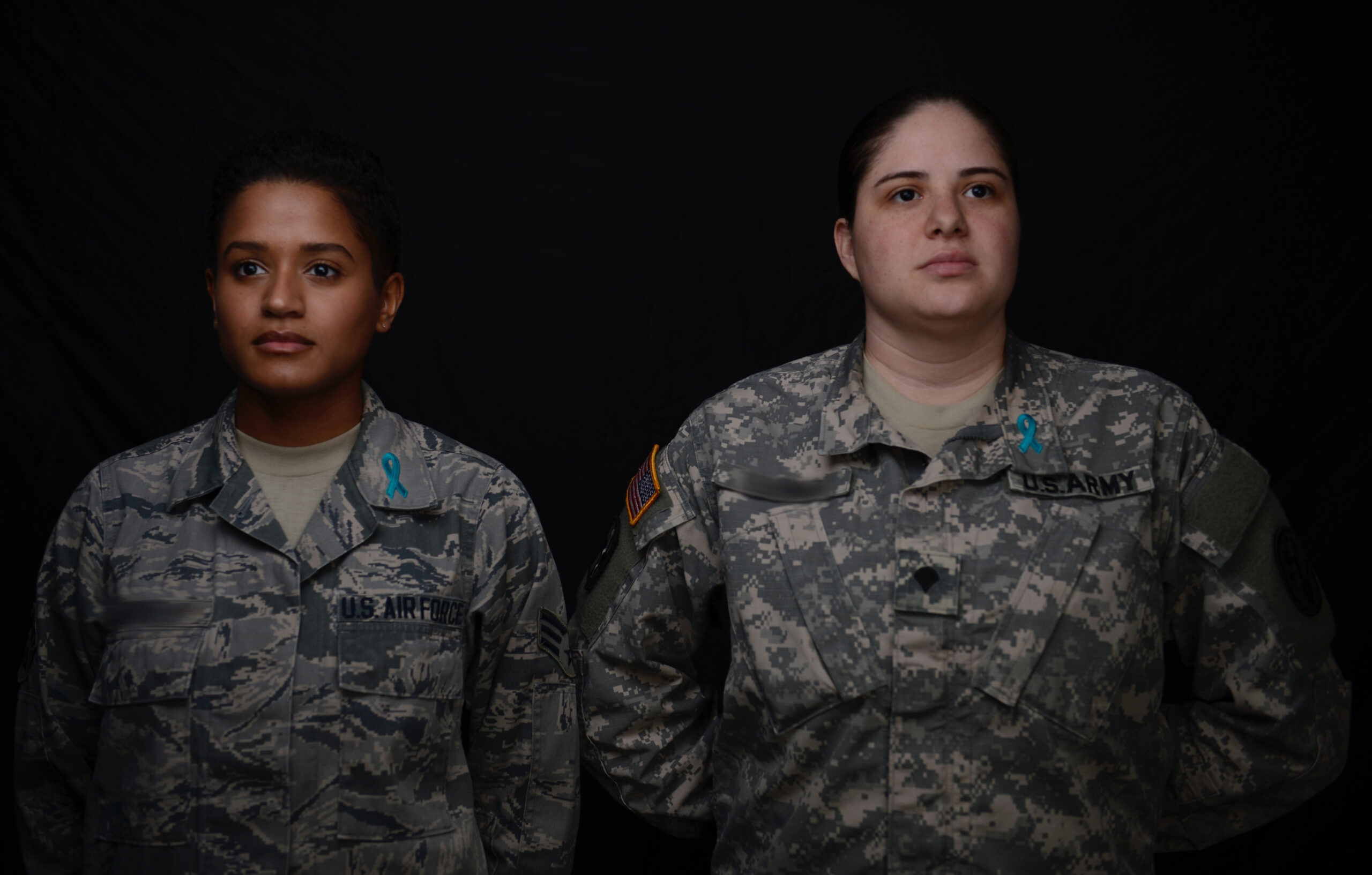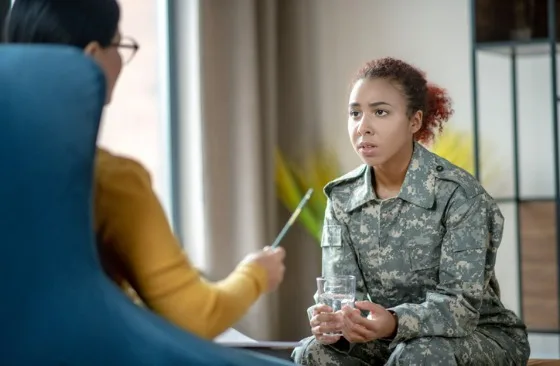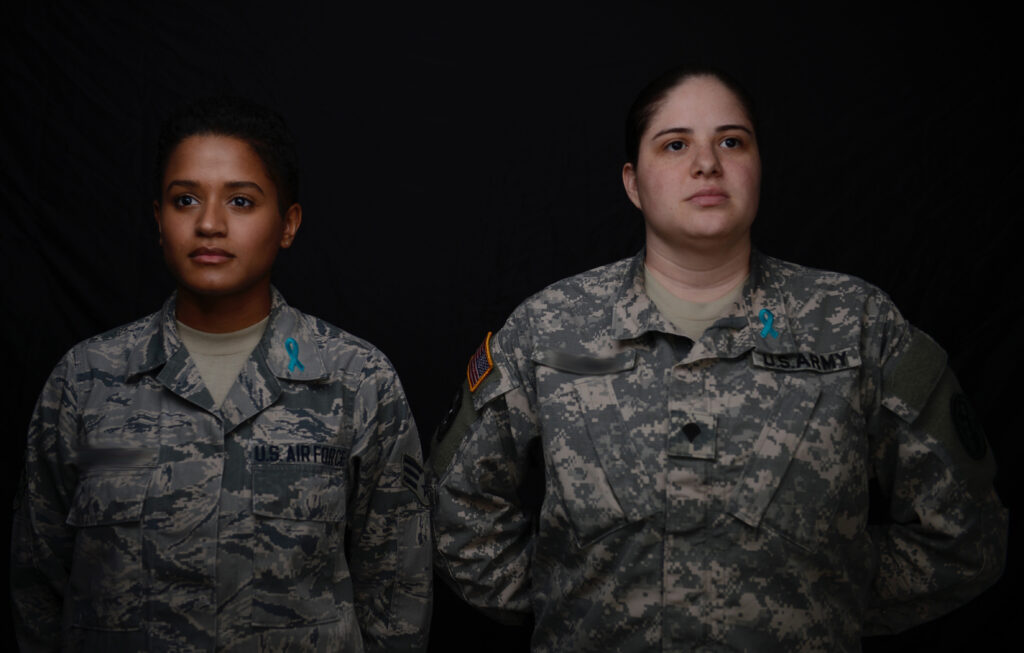For decades, Joanna Sweatt kept quiet about the sexual assaults and sexual harassment she experienced after enlisting in the U.S. Marine Corps, sharing her story only with her closest family and friends.
Speaking out has become part of her therapy, but Sweatt recognizes she’s still working to develop a healthy sense of intimacy after experiencing military sexual trauma (MST) , the phrase the VA uses to describe “sexual assault or threatening sexual harassment experienced during military service.”
“I’ve done a lot of therapy, but when I started to think about the true problem areas I had, I realized I needed to have a counselor who could help me deal with issues related to sex,” Sweatt said. “I needed to develop positive associations with sex. I needed to talk through my experiences.”
Rebuilding intimacy and trust is difficult for any survivors of sexual assault. Experiencing MST, however, can place an additional level of trauma on survivors, said Alexis Zornitta, Ph.D., a private practice psychologist who’s spent much of her career working with veterans.
“Military training is about trust and giving loyalty to people you’re serving with for the sake of group cohesion and accountability,” Zornitta said. “Many times, the perpetrator is a fellow service member or superior — a survivor might have to continue working with or for the perpetrator, be deployed with the perpetrator and even depend on them in life-or-death situations.”
Read: Why Military Sexual Trauma Is So Devastating >>
In civilian life, a survivor could consider removing themselves from environments where they might encounter the perpetrator. In the military, that’s often impossible, and the survivor can be isolated from supportive family and friends when the assault occurs due to their assignment or where they’re stationed. Survivors who want to report an assault can also worry about retaliation from the perpetrator or losing their military career.
Women, racial and sexual minorities, younger people, lower-ranking service members, unmarried people and recent entrants have the highest risk of experiencing MST.
How MST affects intimacy
It’s common for MST survivors to experience strong emotional and physical reactions after an assault that can negatively affect intimacy, Zornitta said. And intimacy isn’t just related to sex — it’s all the ways one can feel connection and closeness.
Physical intimacy challenges could include a fear and avoidance of being around others and not wanting any types of typically appropriate touch, such as handshaking, holding hands or being physically close to another person. Sexual intimacy can be affected as well.
“There’s often a significant fear of potential danger or anxiety, even in safe and normal daily situations,” Zornitta said. “Sexual assault survivors might avoid sex entirely, engage in sex more frequently or in ways they’d normally view as inconsistent with their values. They might lose interest or find themselves dissociating during sexual activity.”
Emotional intimacy challenges can include a fear of getting hurt or being taken advantage of, leading to avoidance in connecting with others through mutual sharing of verbal and nonverbal experiences. MST survivors might also avoid sharing emotional experiences or withdraw from those they’re close to.
“MST survivors can feel people can’t be trusted or that they themselves are damaged,” Zornitta said. “Survivors might find themselves avoiding people, places and activities that are meaningful and intimate to avoid the distress that could arise from a fear of being hurt physically or emotionally.”
Self-intimacy challenges can include a disconnect with oneself and one’s inner experiences. Survivors can experience self-doubt and shame, and feel disconnected from their bodies, thoughts and emotions.
Support is crucial
Although challenges with intimacy specifically are common after MST, Zornitta said, without support systems in place, survivors can find their struggles persisting and getting worse over time. Survivors can have difficulties maintaining current relationships, forming new ones and feeling good about themselves. Negative coping mechanisms, such as drug and alcohol abuse, can develop, and Sweatt said that, in her discussions with other women who’ve survived MST, she’s encountered a good number who have fallen into abusive relationships.
Zornitta recommends survivors look for trauma-informed care providers for their mental and physical health needs.
“A trauma-informed provider will have knowledge about the unique issues faced by MST survivors,” she said. “They provide collaborative care that fosters a sense of safety and trust. There are psychotherapists, there are OB-GYNs — people may not realize that if a survivor goes to an OB-GYN appointment, it can be very triggering. That’s why it’s important to find providers who have the awareness, knowledge and skills needed to really help.”
Partners and loved ones can be very supportive, Zornitta said, but unless they’re trained in understanding MST or have that lived experience, they’re not going to fully grasp what the survivor has been through. She said by listening, gaining knowledge and even coming to therapy with a survivor, partners and loved ones can be wonderful allies in helping survivors rebuild intimacy.
Survivors should do the best they can to take care of their basic needs, Zornitta said, such as eating healthy and getting enough sleep and activity when possible. Using meditation and mindfulness exercises, and paying attention to individual needs and boundaries can also help. Continuing to engage in activities and connecting with loved ones is crucial to working through past trauma.
Most importantly, if you’re a survivor, show yourself compassion and never engage in self-blame.
“It’s important to remember that a survivor is never at fault for what happened,” Zornitta said.
Reconnecting with self
Sweatt recognized that because of her experience with MST, she developed a need for aggressiveness and risk-taking behaviors in sexual experiences with her husband. Sweatt said that although those desires aren’t problematic for everyone, they were unhealthy for her because they emerged from past trauma.
Sweatt credits her husband for being supportive of her healing. In addition to therapy and counseling, she’s also found growth through sharing her story and making more time to take care of herself.
“I want to understand every feeling I have from my head to my toes,” Sweatt said. “When you know how to settle yourself, soothe yourself, please yourself, calm yourself, love yourself, warm yourself — it all radiates outward and through everything else you’re doing. I know people say to love yourself, but it’s really about getting intimate with yourself. Through therapy, you can get your intimacy back. You can start over.”
Resources
DoD SAPR Victim Assistance Program
National Domestic Violence Hotline
Rape, Abuse and Incest National Network (RAINN)
The appearance of U.S. Department of Defense (DoD) visual information does not imply or constitute DoD endorsement.
















